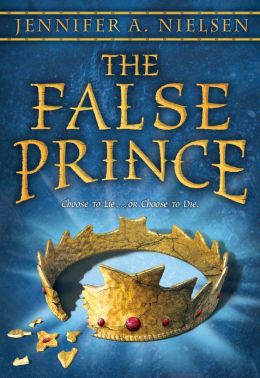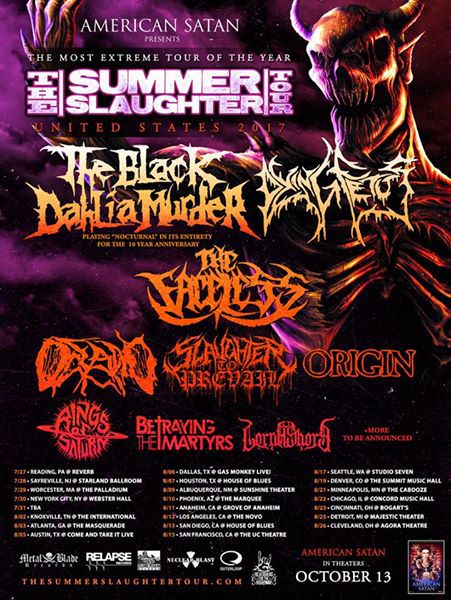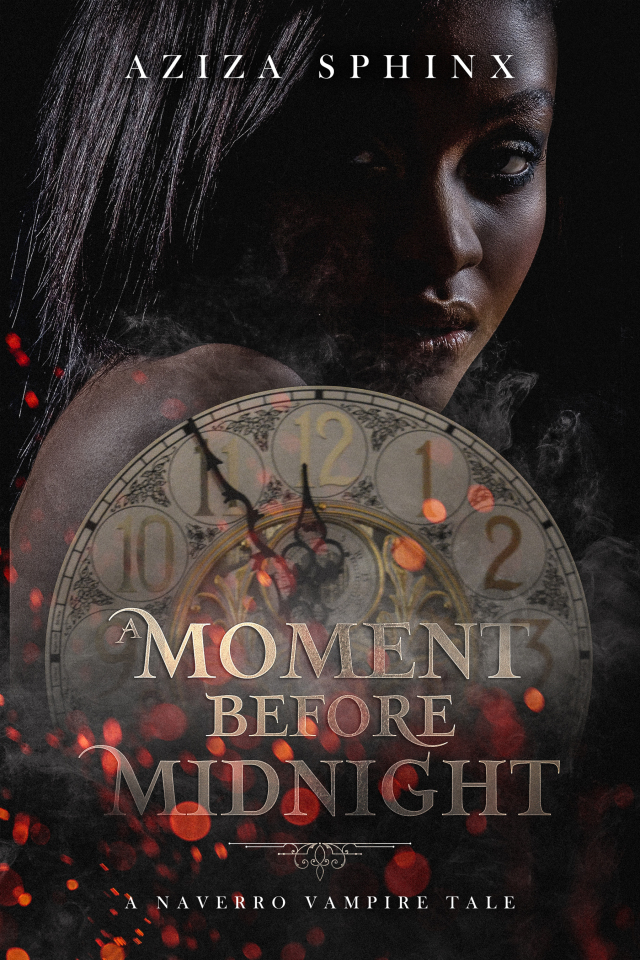 For my Deadly Games retrospective, click here.
For my Deadly Games retrospective, click here.
Spoilers follow…
Killshot 


“It was just a game.” –Gus
Physicist Gus Lloyd is reunited with his ex-wife Lauren after a video game he created comes to life. Because the game casts Gus as the hero and Lauren as his damsel, they’re forced together to fight the evil Jackal and his minion Killshot.
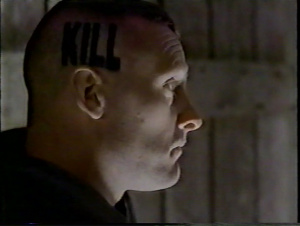 “Killshot” is a promising start, setting up necessary exposition and character relationships succinctly without making it a slog to get through, assuming you don’t think too much about the logic. Not all the characters are 100% their series selves (Jackal is prone to some “dad” humor, and Peter is an annoying plot device), but the Gus/Lauren relationship is an immediate success. Cynthia Gibb and James Calvert share a natural chemistry.
“Killshot” is a promising start, setting up necessary exposition and character relationships succinctly without making it a slog to get through, assuming you don’t think too much about the logic. Not all the characters are 100% their series selves (Jackal is prone to some “dad” humor, and Peter is an annoying plot device), but the Gus/Lauren relationship is an immediate success. Cynthia Gibb and James Calvert share a natural chemistry.
Gibb is the MVP of the episode; she has incredible comic timing and plenty of heart. Lauren is an independent, smart, and sarcastic woman whose cockiness sometimes gets the best of her. Calvert is affable as the nerdy, benignly obsessive Gus Lloyd, and really shines when sharing the screen with Gibb.
 Leonard Nimoy’s direction is effective, with some subtle flourishes you won’t find in later episodes. Tom Rathman is great as the dim-witted Killshot; I get a kick out of every time the big ox howls in fear of water. His plan to drop a nuclear bomb on a football stadium isn’t as creatively weird as his fellow bad guys, but the episode has its hands full just setting up the concept.
Leonard Nimoy’s direction is effective, with some subtle flourishes you won’t find in later episodes. Tom Rathman is great as the dim-witted Killshot; I get a kick out of every time the big ox howls in fear of water. His plan to drop a nuclear bomb on a football stadium isn’t as creatively weird as his fellow bad guys, but the episode has its hands full just setting up the concept.
One Mean Mother



“Did you beat any of these levels, my friend?”
“I tried to make them challenging, which is why we’re having so much fun playing them.” –Peter and Gus
Evil Shirley, a villain based off Gus’s ex-mother-in-law, is set loosed by Jackal at the same time the real Shirley is visiting Lauren.
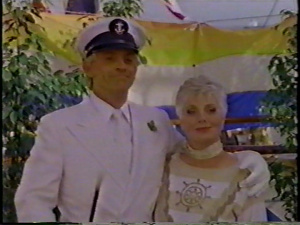 Surprisingly strong second entry. Gus and Lauren’s chemistry continues to shine, and they’re an effective comedy duo during their caper on a cruise ship. Peter is still a third wheel, but amusing when caught between a bickering Gus and Lauren. (“Can you tell her this isn’t hard to remember?” “Don’t you dare.”) Jackal as cruise director is inspired, and Christopher Lloyd is obviously having a blast. After a bumpy start, the show has found Jackal’s sardonic and grim humor; a gregarious sadist who is not to be crossed. Shirley Jones has fun with the uptight Shirley, and has does well with Lloyd. The final act is a little “blah”, but gets the job done.
Surprisingly strong second entry. Gus and Lauren’s chemistry continues to shine, and they’re an effective comedy duo during their caper on a cruise ship. Peter is still a third wheel, but amusing when caught between a bickering Gus and Lauren. (“Can you tell her this isn’t hard to remember?” “Don’t you dare.”) Jackal as cruise director is inspired, and Christopher Lloyd is obviously having a blast. After a bumpy start, the show has found Jackal’s sardonic and grim humor; a gregarious sadist who is not to be crossed. Shirley Jones has fun with the uptight Shirley, and has does well with Lloyd. The final act is a little “blah”, but gets the job done.
The Boss



“You’ll note that when people from my past show up it isn’t with blueprints to destroy the galaxy.” -Lauren
Gus and Lauren are set against evil boss Mr. Metcalf, with whom Jackal is plotting the destruction of an unknown event which fosters innovation. As part of the level, Jackal kidnaps Lauren’s ex-fiancée while trying to tempt her to his side.
 The series continues to build on its successes, delivering its strongest episode yet. LeVar Burton is the first of several Star Trek alum to play a villain (if you don’t count Christopher Lloyd), and appears to relish his role as the boss from hell. Lauren’s ex-fiancée Harry is a major slime, and plays into the TV cliché of an ex so horrible you wonder what the star saw in them. Still, it’s nice to see him get his comeuppance. The twist with the toy tankers is a clever cheat, resulting in a fun scramble at the innovation expo. Jackal and Lauren have a nice runner, with the former trying to tempt the latter to his cause with the promise of ruling New York. (“The city or the state?”) There’s also a fantastic action sequence with Gus jumping onto a truck from a moving car. A major winner.
The series continues to build on its successes, delivering its strongest episode yet. LeVar Burton is the first of several Star Trek alum to play a villain (if you don’t count Christopher Lloyd), and appears to relish his role as the boss from hell. Lauren’s ex-fiancée Harry is a major slime, and plays into the TV cliché of an ex so horrible you wonder what the star saw in them. Still, it’s nice to see him get his comeuppance. The twist with the toy tankers is a clever cheat, resulting in a fun scramble at the innovation expo. Jackal and Lauren have a nice runner, with the former trying to tempt the latter to his cause with the promise of ruling New York. (“The city or the state?”) There’s also a fantastic action sequence with Gus jumping onto a truck from a moving car. A major winner.
The End of Jackal




“Tough Luck, Kid” -Jackal
Jackal initiates the final level after Peter and Gus delete all the other bad guys. When Peter finally succeeds in deleting Jackal, it inadvertently sucks Jackal, Gus, and Lauren into the game computer, where the three have a final showdown.
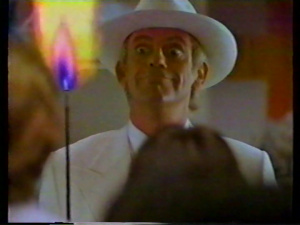 Every episode of Deadly Games has been better than the last, but the streak ends here. Still, what a way to go out! Fantastic; Jackal is at his most threatening, and Lloyd really brings his A game. The revelation that Jackal is Gus’s dad is, as Lauren would say, trite, but there’s enough honest sentiment to make it work. The tension between Gus and Lauren is palpable, though a little one sided. Gus is very petulant in this one, and risks losing the viewer’s sympathy. Cynthia Gibb carries the heart of the episode, selling her frustration and sense of loss at being pushed away by Gus, and has some great line deliveries near the end of the episode. James Calvert sells Gus’s dejected resentment of his father; making up for his whiny behavior. Even Peter gets a moment to shine. Direction is very effective, especially once in the computer. The Dutch angles and close-ups on Lloyd convey the menace of his character, as do the surreal backdrops of the digital hospital.
Every episode of Deadly Games has been better than the last, but the streak ends here. Still, what a way to go out! Fantastic; Jackal is at his most threatening, and Lloyd really brings his A game. The revelation that Jackal is Gus’s dad is, as Lauren would say, trite, but there’s enough honest sentiment to make it work. The tension between Gus and Lauren is palpable, though a little one sided. Gus is very petulant in this one, and risks losing the viewer’s sympathy. Cynthia Gibb carries the heart of the episode, selling her frustration and sense of loss at being pushed away by Gus, and has some great line deliveries near the end of the episode. James Calvert sells Gus’s dejected resentment of his father; making up for his whiny behavior. Even Peter gets a moment to shine. Direction is very effective, especially once in the computer. The Dutch angles and close-ups on Lloyd convey the menace of his character, as do the surreal backdrops of the digital hospital.
 “The End of Jackal” is a great end to the first season of Deadly Games. Unfortunately, its episode four of twelve. Its placement blunts some of the series momentum, and makes Jackal less emotionly resonate with Gus and Lauren.
“The End of Jackal” is a great end to the first season of Deadly Games. Unfortunately, its episode four of twelve. Its placement blunts some of the series momentum, and makes Jackal less emotionly resonate with Gus and Lauren.
(Question: Since Gus and Lauren were converted into computer programs, does that mean they became soulless digital husks who were effectively killed in this episode? If not, does that make all the bad guys sentient?)
The Camp Counselor, Part I

“And no one is singing ’99 Bottles of Beer’ on the Wall!’” -Chuck Manning
Celebrations for the game’s deletion are short-lived, as a virus-like Jackal program sends an evil camp counselor out into the real world. Meanwhile, the presence of Amber, a computer-generated pin-up girl Gus programmed into the game, causes friction between him and Lauren.
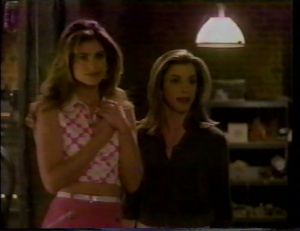 Both halves of “The Camp Counselor” act like a second pilot, rebooting the series and reversing Jackal’s defeat. Regrettably, this episode lacks the charm and sense of purpose “Killshot” had. The subplot with Amber, Gus’s programmed pin-up girl, is shallow. Jackal the computer virus is too powerful given what we know of him; it opens a whole can of worms the series never deals with. If he can do this, he’s nigh unstoppable.
Both halves of “The Camp Counselor” act like a second pilot, rebooting the series and reversing Jackal’s defeat. Regrettably, this episode lacks the charm and sense of purpose “Killshot” had. The subplot with Amber, Gus’s programmed pin-up girl, is shallow. Jackal the computer virus is too powerful given what we know of him; it opens a whole can of worms the series never deals with. If he can do this, he’s nigh unstoppable.
I have major issues with Gus in this episode. He acts like a complete jerk, over-reacting to Lauren having a non-disclosed bank account. In response, he insults her by claiming to have slept with her best friend, which is so nasty it doesn’t matter Lauren didn’t buy it. Her voice when saying “You’re only saying that because you’re angry and want to get back at me” is so full of hurt I wanted to punch Gus. Unfortunately, this is a Gus that returns again in a later episode.
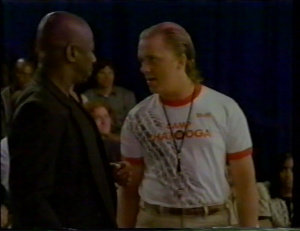 Otherwise, the episode is dull! Anthony Michael Hall gives it his best, but Chuck Manning the Camp Counselor is a boring villain; Jackal’s presence is sorely missed. This is all setup for part two, but I wonder if they could have segued more gracefully from “The End of Jackal.”
Otherwise, the episode is dull! Anthony Michael Hall gives it his best, but Chuck Manning the Camp Counselor is a boring villain; Jackal’s presence is sorely missed. This is all setup for part two, but I wonder if they could have segued more gracefully from “The End of Jackal.”
The Camp Counselor, Part II



“Let me work my magic.”
“You actually have a plan?”
“No, but that’s where the magic comes in; I hope one appears” -Gus and Lauren
Gus and Peter are forced to choose between saving Lauren by releasing Jackal, or losing her to save the world. Their deliberations are complicated by Detective Dorn, who’s investigating incidents connected to their recent adventures.
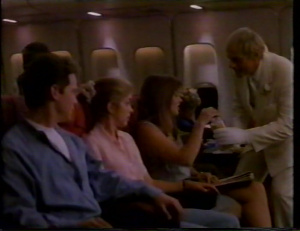 Wow! A huge improvement over part one! Gus is no longer a jackass, and his rapport with Lauren improves immensely. Their adventure to stop Chuck is the purest fun we’ve had since “Evil Shirley’s” boat escapade. Having Jackal back in the thick of things is a much-needed relief, and his sardonic flair compensates for Chuck Manning’s lack of personality . Gus’s decision to free him from the computer to save Lauren is selfish as hell (as the world itself is at stake), but very much in character. He appears to acknowledge that things have changed now that he’s reconciled with his father, but unfortunately nothing comes of it in later episodes.
Wow! A huge improvement over part one! Gus is no longer a jackass, and his rapport with Lauren improves immensely. Their adventure to stop Chuck is the purest fun we’ve had since “Evil Shirley’s” boat escapade. Having Jackal back in the thick of things is a much-needed relief, and his sardonic flair compensates for Chuck Manning’s lack of personality . Gus’s decision to free him from the computer to save Lauren is selfish as hell (as the world itself is at stake), but very much in character. He appears to acknowledge that things have changed now that he’s reconciled with his father, but unfortunately nothing comes of it in later episodes.
Speaking of which, Lauren’s condition after escaping the computer is never mentioned again, even though she now has gaps in her memory. Their inability to shut down the program due to saving Lauren suggests the possibility she’s attached to it forever. After all, if deleting bad guys in the computer removes them from real life, is the same true of Lauren? Ugh… Questions I wish the show never raised, as they’re never addressed.
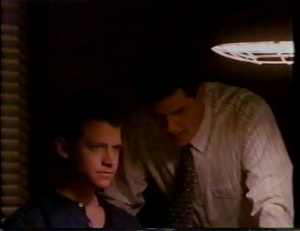 Detective Dorn is an interesting addition to the show. His humor is strident as hell, but when more dry he’s appealing. Sam McMurray is game, but the material isn’t quite there. He’s a great foil for Peter, though, which the character sorely needed. His interrogation scene with Gus, Peter, and Amber is brilliant, and the only time I truly enjoyed Kathy Ireland’s character.
Detective Dorn is an interesting addition to the show. His humor is strident as hell, but when more dry he’s appealing. Sam McMurray is game, but the material isn’t quite there. He’s a great foil for Peter, though, which the character sorely needed. His interrogation scene with Gus, Peter, and Amber is brilliant, and the only time I truly enjoyed Kathy Ireland’s character.
The Practical Joker
“What does he mean, if he’s right or if he’s right?”
“Pay no attention; it’s just something he says.” -Danny Schlecht and Jackal
A rogue bad-guy, secretly programmed by a practical joker, causes havoc in Gus, Peter and Lauren’s friendship. Dealing with a villain who even Jackal can’t control, the trio need to resolve their differences quickly to survive.
 A mean-spirited, mostly unfunny installment. Spiner’s character, Danny Schlecht, is obnoxious as hell . It’s obvious the episode is basing him on Jim Carey’s The Mask (the yellow suit and large props are a dead giveaway), but it just doesn’t work. Schlecht’s pranks are too nasty for this show; he basically commits sexual assault against Lauren and Peter.
A mean-spirited, mostly unfunny installment. Spiner’s character, Danny Schlecht, is obnoxious as hell . It’s obvious the episode is basing him on Jim Carey’s The Mask (the yellow suit and large props are a dead giveaway), but it just doesn’t work. Schlecht’s pranks are too nasty for this show; he basically commits sexual assault against Lauren and Peter.
Meanwhile, Gus reverts to petulant jerk mode, and it’s truly unpleasant. I understand he and Lauren have been getting closer, and a sense of betrayal is justified, but the way he carries on is creepy and possessive (and misplaced given he almost slept with someone else the episode). I’m glad Lauren stood up for herself before consoling him, making it clear they aren’t together and she has the right to be with whoever she wants. I want to see Gus and Lauren get back together, but can’t get behind behavior like this.
As for sitting at their bed waiting for them to wake up? Ewww…
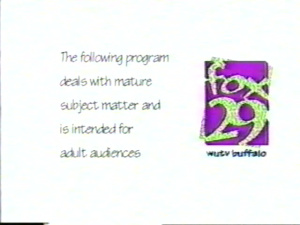
An actual warning in front of this episode. Note the FOX29 logo; Buffalo didn’t have a UPN affiliate until 2001.
Gosh, what else. Jackal is a little out of character, chatting up Gus about future plans. I suspect the writers didn’t know how else to involve him given Danny’s special nature and decided to just have him hang around. His arm wrestling match with “dynamo” Randi Tanenbaum is amusing, as was some of his rapport with Danny, but otherwise not great.
This episode wasn’t a total bomb, but close. Easily the worst of the series, and I suspect UPN was hoping it’d be the best.
The Car Mechanic




“The car mechanic that ruined Gus’s prom night is back, and he’s got on his dancing shoes!” -WUTV Buffalo TV Announcer
A heat-wave stokes Lauren’s dormant feelings for Gus, which are further inflamed while trying to thwart Ross Logon, a villainous Car Mechanic planning to destroy public transportation (all of it). On their trail is Detective Dorn, who has a near-deadly encounter with Jackal.
 The latter half of the season is a jumble of out of order episodes, with this one actually being the last one produced. Accordingly, I’m treating it as the series finale. The episode even jokes about a classic TV show that was cancelled after half a season. Sound familiar?
The latter half of the season is a jumble of out of order episodes, with this one actually being the last one produced. Accordingly, I’m treating it as the series finale. The episode even jokes about a classic TV show that was cancelled after half a season. Sound familiar?
“The Car Mechanic” is a much better episode than one named “The Car Mechanic” should be. In fact, it’s damned good. It brings Gus and Lauren closer than ever, Jackal is both sinister and hilarious, it has a couple of great action sequences, and Peter is given something to do. What more is there to ask?
One pleasant surprise was the return of Detective Dorn, whose off-putting jokes have been dialed back to tolerable levels. Despite not believing the game is real, he’s none-the-less studied it and is ready to play. It’s an intriguing wrinkle, and it’s hilarious watching Dorn ace Gus in figuring the game’s squirrelly logic (even if it results in the car mechanic giving him a heart attack). He again proves a great partner for Peter, acting almost like a straight man to Peter’s panicky frustration.
 Jackal is a blast in this episode. His confrontation with Dorn is fantastic:
Jackal is a blast in this episode. His confrontation with Dorn is fantastic:
“This is no joke, my friend” Dorn says, placing his hand around a cackling Jackal’s arm.
“No, Detective Dorn, it most certainly is not a joke, and I am most certainly not your friend.”
Jackal wrestles Dorn off him and begins walking away, provoking Dorn to pull his gun. Moments later he tries to shoot Ross Logan, but Jackal jumps into frame with a cigar chomping grin, grabbing the bullet between his thumb and index finger, and flings it into a mirror Lauren is holding. In the course of a minute he goes from laughing to threatening to Bugs Bunny, and I don’t think there’s a better Jackal scene in the entire series.
(Disappointingly, our last sight of Jackal is him cackling with glee as his plot is coming to fruition. He doesn’t stick around once it’s foiled, nor do we get a single reaction shot.)
 The absolute best part of the episode, without a doubt, is Lauren and Gus. The show takes place during a heat wave, and they each separately begin fantasizing about the other. Lauren gets so hot (literally and figuratively) that she falls out of bed with a good thud. Later, while in play, they’re tormented by the sight of Peter and his girlfriend constantly on one another. Then, while hunting Logan, they stake out a drive-in theater, where they nearly make out under the guise of “fitting in.” Of course, they’re interrupted by Jackal kidnapping them, but while tied to a train track (ha), Lauren admits she wished they’d made love one last time. Wow.
The absolute best part of the episode, without a doubt, is Lauren and Gus. The show takes place during a heat wave, and they each separately begin fantasizing about the other. Lauren gets so hot (literally and figuratively) that she falls out of bed with a good thud. Later, while in play, they’re tormented by the sight of Peter and his girlfriend constantly on one another. Then, while hunting Logan, they stake out a drive-in theater, where they nearly make out under the guise of “fitting in.” Of course, they’re interrupted by Jackal kidnapping them, but while tied to a train track (ha), Lauren admits she wished they’d made love one last time. Wow.
The show doesn’t finally pair them up, but Lauren acknowledges their attraction and suggests waiting until the game is over before doing anything. I have no doubt they would have been together by season’s end.
I admit, this is a lot of emphasis to put on an action-comedy romance, but the fact there is progression within the twelve episodes helps strengthen a series which didn’t have time to flourish. Sam and Diane spent seasons building their romantic tension; Gus and Lauren do it believably in a fraction of the time.
If the show needed to end, this is as great a place as any. We know where they’re headed, and that they’re content being back in each other’s lives. It’s a beautiful coda, and one I can live with.
The Divorce Lawyer




“Ah, electrocution. I note this level is especially whimsical.” -Lauren
Jackal follows Lauren to Washington D.C., where her interview with the President is pre-empted by an electrifying duplicate of her divorce attorney. While Gus flies out to D.C. to help, Peter continues his efforts to delete the game.
The jumble continues. “The Divorce Lawyer” was produced before “The End of Jackal,” and in fact sets up Gus’s father’s birthday and the deletion of the game. To get even more confusing, the episode has an extended introduction that includes a brief snippet from “The End of Jackal.”
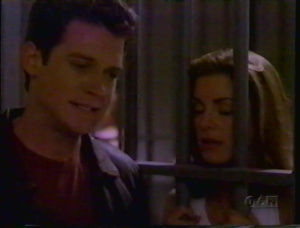 This is a strong episode that mixes up the show’s formula by placing “The Girl” in charge of the level, with Gus as second fiddle. Lauren is slow to embrace her leading role, but is fully into it by episode’s end. Gibb gives a wonderful performance; from her gentle mocking of Gus to gleefully being dragged away to jail after her divorce lawyer goes up in lights; she delivers everything with equal wit and cocky glee.
This is a strong episode that mixes up the show’s formula by placing “The Girl” in charge of the level, with Gus as second fiddle. Lauren is slow to embrace her leading role, but is fully into it by episode’s end. Gibb gives a wonderful performance; from her gentle mocking of Gus to gleefully being dragged away to jail after her divorce lawyer goes up in lights; she delivers everything with equal wit and cocky glee.
Peter’s temporary deletion of this episode’s villain puts Jackal on the defensive, leading to several great scenes. One has him assessing a lineup of bad guys to replace Courtney Lake (the divorce lawyer), which includes a blind woman with a seeing eye dog! The cops discover this and direct Jackal to vacate; in response, Jackal remote controls their squad car and sends it away (later in the episode you see the car speeding backwards down the street). Later, Jackal confronts Gus at the courthouse, and while sizing each other up walks him straight into an elevator, which Courtney promptly breaks. The man is taking no chances, and even hacks the game at episode’s end, setting up “The Camp Counselor.” Lloyd is great, as always.
This episode represents the kind of format shakeup Deadly Games would need if it continued, and resultantmg is one of its best episodes.
The Motivational Speaker



“Anything with Mel Gibson.” -Lauren, in a more innocent time for our country
Jackal attempts to destroy Gus and Peter’s friendship with Nathan Abrams, a fast talking motivational speaker who Gus had turned to after his divorce. This complicates Gus and Lauren’s attempt to stop the motivational speaker from blowing up the New Year’s Eve ball in Times Square.
 Gus and Lauren’s relationship continues to track, and since this episode was produced right before “The Car Mechanic,” it makes sense they should share a semi-romantic dance above Times Square on New Year’s Eve. They truly seem simpatico this installment; Lauren immediately gets Gus’s game logic, and doesn’t blame him for the horrific deed he programed the Motivational Speaker with. The episode is sprinked with flashbacks to their actual relationship, which are so melancholy they hurt. At first, they just want to shut the world out and be together; neither seeming particularly comfortable in a crowd. Later, they’ve drifted apart for reasons unknown. You can tell Gus feels he’s missing something worthwhile for Lauren to love, which is symbolized by Gus not being able to dance.
Gus and Lauren’s relationship continues to track, and since this episode was produced right before “The Car Mechanic,” it makes sense they should share a semi-romantic dance above Times Square on New Year’s Eve. They truly seem simpatico this installment; Lauren immediately gets Gus’s game logic, and doesn’t blame him for the horrific deed he programed the Motivational Speaker with. The episode is sprinked with flashbacks to their actual relationship, which are so melancholy they hurt. At first, they just want to shut the world out and be together; neither seeming particularly comfortable in a crowd. Later, they’ve drifted apart for reasons unknown. You can tell Gus feels he’s missing something worthwhile for Lauren to love, which is symbolized by Gus not being able to dance.
“The Kid can dance.” An impressed Lauren says while watching the game tape.
“The Kid can do anything.” Gus says, in awe of his own creation.
It may not be obvious, but I want these two kids together.

This episode’s night of programming was hosted by the girls from Baywatch. Just like ABC’s TGIF lineup; only with bathing suits
After a run of less than impressive villains, Dwight Schultz arrives to show ‘em how it’s done! Schultz’s motivational speaker, Nathan Abrams, oozes sleaze. His rapid-fire nonsense about resolving to “start fresh” rings true of real late-night shysters, and Schultz goes over-the-top without becoming unbearable. This villain has a heightened personality like the Practical Joker, but unlike Spiner’ s character, Abrams never annoys the audience. Who he does annoy is Jackal, which makes their dynamic a hoot!
Less successful is the double-double cross involving Peter. This is the second instance of Jackal resenting Peter Rucker, and it’s an interesting concept I wish we’d seen more of. His plan of laying an obvious trap to trick Peter into accepting a false lead is a bit too convoluted for its own good, and the episode doesn’t play it 100% fair with the audience.
Still, it’s fun to have Peter front and center. His conflict with Gus is forced (for obvious reasons), but it acknowledges Peter’s second-fiddle role in the show. Peter was being developed more in the last few episodes, and it’s a shame that didn’t get to play out.
The Trash Man

“Just garbage? I’m afraid you’ve under-estimated the value of my precious cargo.” – Roy Hopkins
The gang travel to Las Vegas to stop Roy Hopkins, a pretentious trash man who’s programmed to destroy landmarks from Gus and Lauren’s romantic past. This couldn’t come at a worse time, as Gus’s mortgage lender has evicted him from his home.
The best way to describe this episode is “eh.” Dumping toxic sludge on a stadium crowd isn’t that inspired; I’m sure Captain Planet did it all the time. Mike Starr does a yeoman’s job as garbage man Roy Hopkins, whose flowery language about trash collection is amusing, but he’s not enough to redeem the episode.
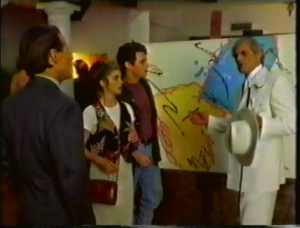 Uninspired is Gus’s money-making schemes to pay his mortgage. If you’ve seen one scene of someone losing at blackjack, you’ve seen every scene of someone losing at blackjack. If you’ve seen one scene of someone haggling with a used cars salesman, you’ve seen them all. There’s a fun moment with Gus trying to sell something he drew with Lauren’s makeup as a modern art piece, but even that’s trite.
Uninspired is Gus’s money-making schemes to pay his mortgage. If you’ve seen one scene of someone losing at blackjack, you’ve seen every scene of someone losing at blackjack. If you’ve seen one scene of someone haggling with a used cars salesman, you’ve seen them all. There’s a fun moment with Gus trying to sell something he drew with Lauren’s makeup as a modern art piece, but even that’s trite.
(Can we forever retire “Money (That’s What I Want)” from being paired with Las Vegas TV shows and movies? At least they didn’t use “Big Spender”…)
Lauren isn’t on her game this installment. She’s famous for talking smack to Jackal, usually at the worst possible times, but here the best she does is a half-hearted “we’ll never give up.” I didn’t buy her declaration, and I doubt that was the intent.
This is the lazy, formulaic kind of episode that many feared the show’s concept would produce. Take a random profession (trash man), make up a Lauren related vendetta (wouldn’t let Gus search for wedding ring), follow the villains moves, Jackal cackles, final fight, Jackal licks his wounds. It’s not horrible, just terribly unimaginative.
Dr. Kramer


“That was a close one.”
“Wanna quit?”
“I think not, Kid. The occasional fluke aside, my ultimate victory is a foregone conclusion.”
“You know, to be honest, I don’t remember programming you to be so full of crap.”
“You know, sometimes, Kid, I wonder if you know why you programmed me.” -Jackal and Gus
Gus’s deranged orthodontist is out to destroy laughter, at coincidently the same time Lauren’s friend is getting back into comedy. Will Jackal get the last laugh?
(Sorry; couldn’t resist.)
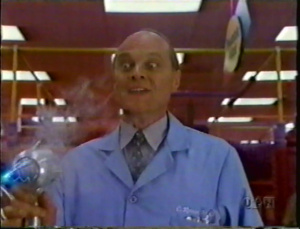 Though out of order, this is a much better final episode than “The Trash Man.” It’s got some of that early series dynamic, especially in Lauren’s attitude toward Gus and the game. Peter’s back to being a plot device, despite showing some character in the teaser. Christopher Neame is dryly hilarious as Dr. Kramer (“the funny orthodontist!”), although he didn’t get much to do. There’s a mid-episode cheat involving a hologram I wish they hadn’t done, but at least it was proceeded by one of Lauren’s patented Jackal smack talks.
Though out of order, this is a much better final episode than “The Trash Man.” It’s got some of that early series dynamic, especially in Lauren’s attitude toward Gus and the game. Peter’s back to being a plot device, despite showing some character in the teaser. Christopher Neame is dryly hilarious as Dr. Kramer (“the funny orthodontist!”), although he didn’t get much to do. There’s a mid-episode cheat involving a hologram I wish they hadn’t done, but at least it was proceeded by one of Lauren’s patented Jackal smack talks.
Deadly Games is a show built on coincidences, and this episode has a couple of doozies. Gus is first attacked by Dr. Kramer in the only dentist’s office in the universe with donut holes; even Jackal comments on it (Dr. Kramer is weak to sugar). The villain’s objective is to destroy laughter by gassing a comedy club, the same one Lauren’s comedian friend Phil is staging a comeback at. There’s no real explanation for her friendship with a washed-up comedian from the 60s; it’s so random.
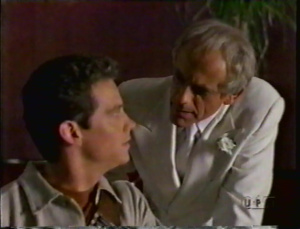 There are some good character beats, including a visit from Jackal where he offers a game of high card to Gus; if Gus wins he’ll call it quits, if Jackal wins its Gus’s life. Peter stops the game, but later returns to find Gus had won. There’s a great conversation where Gus accuses Lauren of being one of “them,” meaning the popular kids in high school who had perfect complexions and attended parties every weekend. Lauren doesn’t disagree, but has a nice rant about a common social problem suffered by teenage girls.
There are some good character beats, including a visit from Jackal where he offers a game of high card to Gus; if Gus wins he’ll call it quits, if Jackal wins its Gus’s life. Peter stops the game, but later returns to find Gus had won. There’s a great conversation where Gus accuses Lauren of being one of “them,” meaning the popular kids in high school who had perfect complexions and attended parties every weekend. Lauren doesn’t disagree, but has a nice rant about a common social problem suffered by teenage girls.
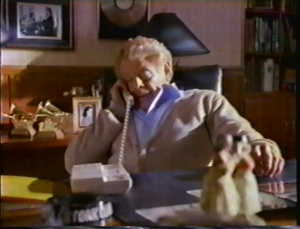 Jerry Stiller’s Phil Cullen is a sympathetic character, but every time he’s on screen it feels like a different show. He’s a widower with self-confidence issues, and his pain is keenly felt. At one-point Lauren begins a statement by reminding him how long it’s been since his wife passed, and he responds “Why’s everyone always reminding me how long my wife’s been dead?” That’s a heavy line for a one-off character in an action dramedy, and it cuts to the core.
Jerry Stiller’s Phil Cullen is a sympathetic character, but every time he’s on screen it feels like a different show. He’s a widower with self-confidence issues, and his pain is keenly felt. At one-point Lauren begins a statement by reminding him how long it’s been since his wife passed, and he responds “Why’s everyone always reminding me how long my wife’s been dead?” That’s a heavy line for a one-off character in an action dramedy, and it cuts to the core.
